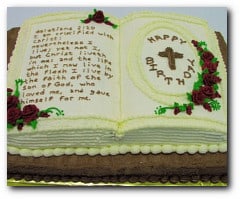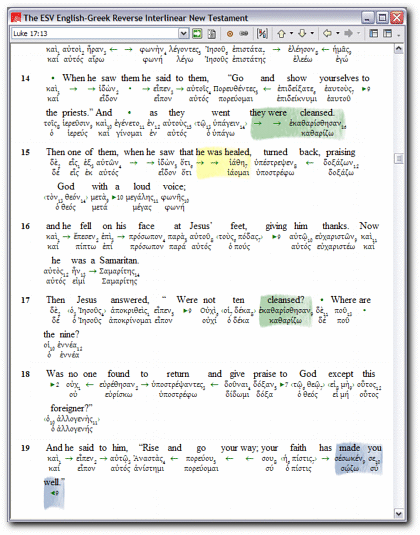“So you work for that Logos software company…”
With 130+ employees and 5 years in Bellingham, Logos has become a big enough fish in a relatively small pond that I now hear something like this pretty regularly when I meet someone new.
This past weekend, I was at a birthday party for my wife’s good friend. My wife’s friend’s dad (let’s call him Bill) heard I worked for Logos and jumped right into a discussion of translation philosophies, the benefit of studying the New Testament in Greek, and the rendering into English of a number of his favorite passages.
It was a fun conversation, but, man, was I ever pining for my Logos Bible Software.
At one point, the discussion turned to Luke 17 and the cleansing of the ten lepers. As you recall, ten were cleansed but only one—a Samaritan—returned to thank Jesus. Jesus tells the man, “Rise and go your way; your faith has made you well.”
Bill observed that the Greek word translated “made you well” in verse 19 is not the same word used for the lepers’ cleansing earlier in the passage. In verse 19, the word is a form ofσῴζω (rescue, save, heal) while in verses 14 and 17 καθαρίζω (make clean, purify, heal) is used. [My glosses here are from DBL Greek.]
Bill wanted to make a distinction here that the man’s faith was instrumental in his salvation, not his healing.
I hadn’t studied the passage in enough depth to have an opinion…but the cool thing is that Logos Bible Software makes it very easy to dig in and explore a question like this. A great place to begin is with the ESV English-Greek Reverse Interlinear of the New Testament.
A quick glance shows me that there are actually three different Greek words used in this passage to describe what happened to the lepers. In verse 15, Luke writes that the Samaritan sees that he is healed (ἰάομαι).
To give myself some visual markers, I grabbed the highlighter tool from the main Logos toolbar and applied a different color for each of the three words I was interested in studying (click the image above for a closer look).
From here it was mere child’s play to execute the mechanics of word study and dig into these three words. I don’t have an answer yet (and I’m holding off on looking at commentaries until I get a little further into the study) but if you are inspired to check it out for yourself here are a couple of pointers:
- To very quickly find out how the ESV translates each of these words across the New Testament, use either Speed Search or Englishman’s Concordance (both available from the right-click menu).
- If you use Speed Search, you want to right-click a word and choose Selected Text | Lemma | Speed Search This Resource. (Use lemma instead of manuscript form because we want to find all instances of the word in the NT, not only instances that share the form of the word as it appears here in this passage.)
- Bible Word Study report gives you visualizations that make it easy to see translation frequencies at a glance. Because of the syntactically tagged resources in Logos 3, it also shows syntactical patterns. For example, your faith is the most common subject of clauses where σῴζω (rescue, save, heal) is the verb.
Enjoy!






